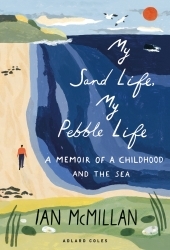5 Questions About Writing With . . . Ian McMillan

Ian McMillan (Credit: Photo, Adrian Mealing)
Ian McMillan is a writer and broadcaster who presents The Verb on BBC Radio 4 every week and its sister programme The Adverb. He hosts both the annual T.S.Eliot Prize Readings and the Academy of Urbanism Awards. He’s written poems, plays, a verse autobiography Talking Myself Home and a voyage round Yorkshire in Neither Nowt Nor Summat. His latest book with Bloomsbury is My Sand Life, My Pebble Life, a memoir of a childhood and the sea. Ian is poet-in-residence for Barnsley FC and was Barnsley’s Lockdown Poet. He’s a regular on Pick of the Week, Last Word and BBC Proms Plus. He’s been a castaway on Desert Island Discs.
How do you discipline/motivate yourself to write and do you set daily targets?
I try to write every day and the motivation is always that if I don’t there will be blank pages in magazines and newspapers and books and there will be empty air on the radio. I prime myself for writing by going on my early stroll at 05.20 and then forcing myself to see five different things on a stroll I’ve taken for years; I pound my brain to make language from the things I notice and then when I get home I tweet the five things I’ve seen and then I’m set up for the day. For me it’s essential to write every day because if I don’t then I’m anxious that I might forget how to do it!
What are the most important qualities required by a writer? Do you have them?
A sense of wonder and a sense of discipline. Both of these can be cultivated and developed. A sense of wonder is essential because the world is, for all its faults, a wonderful place and as a writer it’s my job to report on it. I try to remind myself that the so-called ordinary is really extraordinary, even if it doesn’t seem like it in the drizzle! Discipline is so important: I have to write every day, I have to rewrite every day, I have to read every day and I have to reread every day.
How do you market yourself and your books?
I leave that up to my wonderful agent. I will say that, at least when you first start, you should say yes to every writing and performing opportunity but at the same time be wary of the people who don’t want to pay you and who say that doing something for nothing will be good exposure. There are certain things that I will do for nothing but it should never be expected that you will. You can’t spend exposure in the shop!
Which writing resources have you found useful, e.g., books, courses, organisations, websites etc.?
The Arvon Foundation was my writing school. I went on courses at their centre in Lumb Bank as a very young man and the things I learned there about writing and performing have stood me in very good stead over the years.
A top tip for other writers?
Always read as a writer. Examine each sentence as though you’ve written it and think how you might improve it. Think of yourself as the co-writer of anything you read, and remember that all writing, no matter who it’s by, can always be improved. Oh, and carry your notebook everywhere, or your phone if you want to leave yourself a voice note. That idea won’t remember itself!
About My Sand Life, My Pebble Life A memoir of a childhood and the sea. My life measured out in tides, coming in and going out and doing the same again. My life measured out in games of trying to spot the sea first.
A memoir of a childhood and the sea. My life measured out in tides, coming in and going out and doing the same again. My life measured out in games of trying to spot the sea first.
A heartwarming and salt-water infused collection of coastal memories. In this perceptive and funny book, Ian transports us to a coastline rich in memories. He recalls his days by the sea, from Cleethorpes to Suffolk, from the coast of Northumberland to Blackpool, Scarborough, and the Isle of Skye. He walks barefoot to the sea to see the sun rise; he is attacked by seagulls, midges, and wasps; he eats a lot of fish & chips and it’s always the best yet; he nearly avoids a frisbee; he searches for jazz. In writing peppered with poetry, Ian recounts the memories and experiences that have shaped who he is today.
My Sand Life, My Pebble Life is available on Kindle and in hardback and audio formats.



